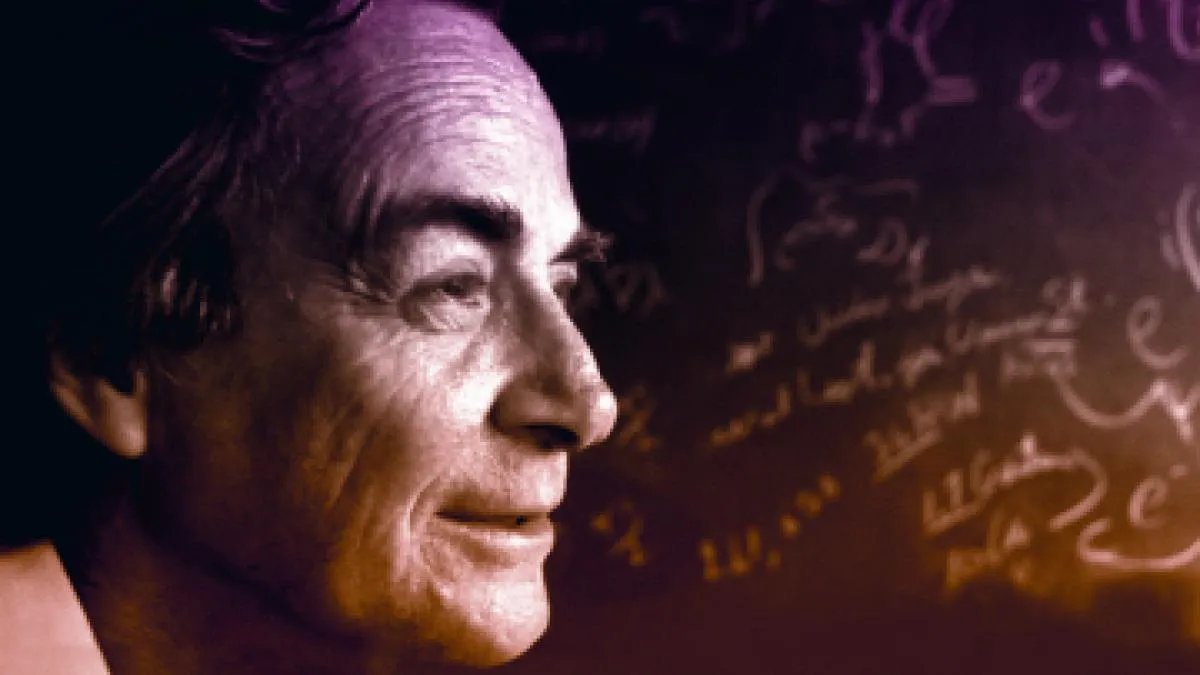Richard Feynman has been my inspiration for over 20 years, which is not something my 19-year-old self would ever have seen coming.
Back then, freshly embarked on an undergraduate physics course at The University of York, I’d begun to think I’d bitten off more than I could chew. Physics at this level was difficult and, in the beginning, not much fun. So when a relative gave me the biography of a famous physicist for my birthday, it felt like a busman’s holiday. The face looking out from the cover of ‘Surely You’re Joking, Mr Feynman!’ was entirely unfamiliar. What’s more, I couldn’t imagine any physicist’s life being particularly exciting (this was BC, or Before Cox).

Out of a sense of family obligation, I read the book. What poured from the pages was the wit and wisdom of somebody who’d lived an absolutely incredible life. This was a man who just loved science, carrying out sophisticated experiments with ants and trying to direct his own dreams... purely for fun. He’d helped design the atomic bomb at Los Alamos, and learned how to crack safes as a boredom-beating sideline. And then he’d invented one of the most useful theories in physics and won the Nobel Prize – an award he accepted only grudgingly, such was his distaste for personal honours.
Feynman, then, was completely unconventional – indeed, the book was subtitled ‘Adventures of a curious character’. He was a professor of physics who was also a rebel... a man of the people who enjoyed hanging out with artists, lap dancers and musicians. A magnetic personality, he played the bongo drums, drove a van with scientific diagrams on the side and was never short of female attention. He lived in sunny California – a long way, it seemed, from the chilly north of England. (I later learned that Feynman’s third wife was from Yorkshire).
When it dawned on me that Feynman was no longer with us, I felt a huge sense of sadness. Not just because I’d never get to meet him or attend one of his lectures, but because the world had lost a unique, inspirational figure – a true genius. The world seemed a poorer place without Feynman in it.
As I struggled through my degree, I thought of Feynman often. I bought all his books, absorbed his philosophies on science and life, and gradually found out more about him. It was a year or two before I saw him on TV, in an episode ofHorizon. It seems incredible, now that we have YouTube, but this was the first time I had heard him speak. His thick New York accent took me by surprise, as did the sheer force of his charisma. The man was, quite simply, a force of nature.
Looking back, it was ironic that my introduction to Feynman came through his books. Apparently he didn’t even like writing. His physics lectures were transcribed and edited by students and colleagues at Caltech. His ‘autobiographies’ were actually transcripts of conversations with his friend Ralph Leighton, who recorded Feynman’s incredible stories for posterity. And largely thanks to Leighton, he achieved wider recognition – ‘Surely You’re Joking, Mr Feynman!’ enjoyed a long stay on the New York Times bestseller list.
Subsequently, other scientists and biographers published books about Feynman. The man who emerged from them was more complicated than the image he presented to the world. Some of his famous stories may or may not have been true. Aspects of his personality weren’t very appealing. He was, in other words, human – flawed, like all of us.
None of this new knowledge dampened my admiration for Feynman’s scientific breakthroughs, nor my enjoyment of his colourful anecdotes and encounters. They continue to enrich my life, just like the works of my favourite authors, musicians and film directors. Few people achieve his level of greatness, and I’m just grateful I discovered him.
In recent years it’s become clear just how popular Feynman remains, with ongoing celebrations of his life and work. In 2008, filmmaker Christopher Sykes began uploading hisTV interviews with Feynmanto YouTube. Two years later, Prof Brian Cox presented aradio programmeon Feynman’s life and work. And this May, on what would have been his 95thbirthday, comedian Robin Ince hosts ‘A day celebrating Richard Feynman’ at London’s Bloomsbury Theatre.
Thanks to Robin, Brian, Christopher, Ralph and others, Richard Feynman lives on. So if you’ve never heard of him until today, what are you waiting for? He might change your life too.
Follow Science Focus onTwitter,Facebook, Instagramand Flipboard